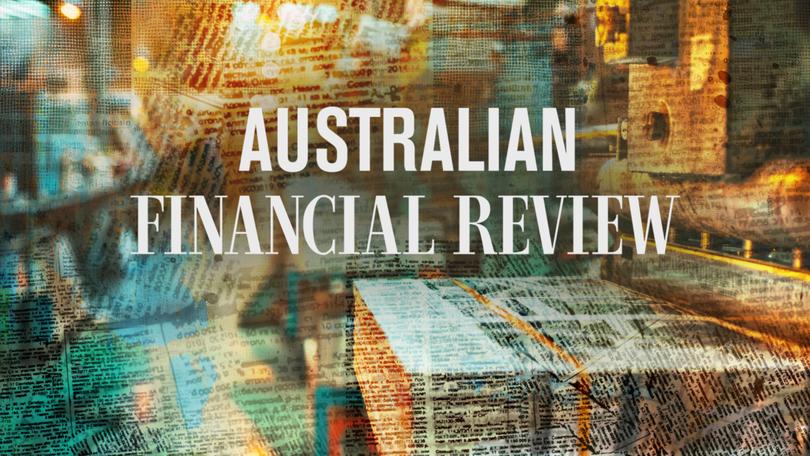CHRISTOPHER DORE: Australian Financial Review is the architect of its own demise in WA
CHRISTOPHER DORE: Nine Entertainment’s hysterical response to an increase in printing costs of the Australian Financial Review is an insult to its handful of readers’ intelligence.

Don’t let the facts get in the way of a good story.
For an organisation that claims to be a publisher of serious journalism, Nine Entertainment Group’s disingenuous, duplicitous and dishonest portrayal of its own decision to stop selling the printed version of The Australian Financial Review in WA would — but maybe shouldn’t — come as a surprise to both the executive class it claims to cater for and the companies it chooses to cover.
To call the personal and nasty campaign it launched hysterical is an understatement. Nine summoned all the might of its nationwide print, digital, television and radio outlets to launch an undergraduate and barely lucid spray against Seven West Media, coupling it with a menacing and mendacious attack on its chairman Kerry Stokes.
Sign up to The Nightly's newsletters.
Get the first look at the digital newspaper, curated daily stories and breaking headlines delivered to your inbox.
By continuing you agree to our Terms and Privacy Policy.In one report, the AFR described Stokes as a “local media monopolist” with too much power because he owns The West Australian and Seven. Ignoring the national daily newspaper owned by News Corp, it also overlooked the fact that Nine owns Seven’s TV rival Nine, the major news radio station 6PR and runs the once-national AFR and the local news site WA Today.
Nine co-opted useful idiots in Canberra, inner-city teal MPs based in Sydney and Melbourne, to endorse a conspiratorial narrative about Stokes and to make false and typically absurd noises about media concentration and monopoly power in Perth. It recruited Kate Chaney, a naive and conflicted local teal to its cause, and embarrassed stale competition watchdogs Graeme Samuel and Allan Fels by luring them into statements that were ill-informed and perverse.
The vehemence of the campaign against Stokes, whose interests own the only major printing outfit, Colourpress, was either foolishly ill-conceived or deliberately designed to mask Nine’s commercial decision firstly to abandon its own printing press, its regional papers and its dwindling print readers. It only served to expose Nine’s hypocrisy.
Using the gravitas of its East Coast-centric flagship masthead and exploiting the erstwhile reputations of its finance journalists, Nine not only wantonly misled the market, but conducted itself in the bullying way it routinely accuses rivals of behaving — using the power of its considerable media assets to wage a campaign of retaliation against a competitor for blatant and debased commercial purposes.
The Sydney-based Nine group, chaired by former Federal treasurer Peter Costello, is a $2.4 billion business which owns television stations, radio networks, big newspapers and major digital news sites across the nation. It directly and mischievously accused Stokes, who owns a very successful $300m media business, of abusing market power by rudely asking Nine to pay more for printing a measly and inconvenient 2000 copies of the AFR each day.
At under $1.40 a copy, this is not a lucrative account for a modern plant that can print 200,000 newspapers an hour and turns out tens of millions of newspapers each year. Naturally, it costs more to stop the presses at peak hour each day and churn out minuscule batches of the AFR, which retails at $5 a copy, than it does to print big runs. For reference, the Kalgoorlie Miner has a daily circulation almost double that of the AFR in Perth.
But while Nine, sorta, wants to be in the printed newspaper business, it decided several years ago it no longer wants to be in the business of printing newspapers.
Instead, it chose to shut down its own presses, offload hundreds of jobs and outsource all of its printing to rival news organisations Seven West Media and News Corp. Uniquely, Nine, an inherently negative and inwardly focused publisher, profits from asking its rivals to print its newspapers for them, yet is happy to aggressively disparage those businesses in those very newspapers. Surely that warrants a premium.
By refusing to agree to engage in sensible pricing talks and banking the savings to focus on its digital business, Nine then hoped to divert attention from its failing newspaper model to blame Stokes and fool readers into thinking the AFR, with its 2000 copies, most sold at a substantial discount, was a serious player in the printed newspaper market. Even at a lower cover price, Nine would have no hope of increasing sales.
Nine claimed it was “forced” by Seven West Media into its decision to abandon WA. Of course, that’s wrong. It chose to quit print and blame someone else, outrageously deciding to demonise Kerry Stokes in the process.
In doing so it insulted the intelligence of its readers, “the great bulk” of which, according to the AFR’s editor-in-chief Michael Stutchbury, “are digital”. So even he admits, the paper really isn’t a thing for them, but “print still plays a special role”. While the masthead is a very profitable mostly digital business East Coast brand, the AFR would be plunged “into a loss in WA” if it had to pay any more to have it printed.
If having a truly national newspaper and serving WA readers was as important as they attest, the AFR could have comfortably covered the newspaper loss from its profitable digital subscription business.
It didn’t have to be this way of course.
A series of decisions by Nine and Nine alone, including its final one, to refuse to enter into negotiations over the price of printing its financial pamphlet, led to the AFR’s demise.
In all its carry-on, Nine failed to tell readers that Seven West Media had very reluctantly only agreed to start printing the AFR 12 months ago, on a month-by-month contract. This was not a long-term deal.
And Nine landed in this predicament entirely of its own making when it first abandoned WA five years ago, selling the former Fairfax Media regional newspapers to publisher Antony Catalano, along with its printing plant in Mandurah. Nationwide, Nine, evidently not seriously committed to print, or communities, offloaded 160 regional newspapers.
Lo and behold, the Mandurah plant, run by the junk mail group IVE, went broke. It shut down in May last year when Catalano closed the last four Fairfax regionals in the state.
As The West Australian’s Neale Prior points out, Catalano’s team cited high newsprint costs for shuttering the Busselton-Dunsborough Mail, Augusta-Margaret River Mail, Mandurah Mail and the Bunbury Mail.
So much for Nine’s commitment to WA, the resources-rich powerhouse State driving the Australian economy. After selling out its regional interests, Nine’s AFR talked a big game, but until very recently only employed one print journalist.
To be fair, just as Seven West doubled its price to print the newspaper, the AFR too has recently doubled its contingent of journalists.
It now has two.
Independent, Always?
How about avaricious, hypocritical, incoherent. Always.

